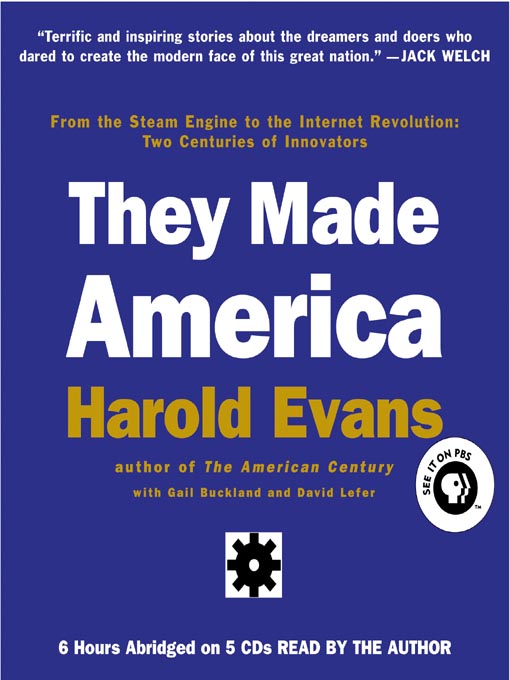
They Made America
From the Steam Engine to the Search Engine--Two Centuries of Innovators
کتاب های مرتبط
- اطلاعات
- نقد و بررسی
- دیدگاه کاربران
نقد و بررسی

Starred review from September 13, 2004
Developed in tandem with a four-part PBS series to air in November, Evans's profusely illustrated and elegantly written book offers the same breadth and scope as his previous bestseller, The American Century
. Evans, former president and publisher of Random House, profiles 70 of America's leading inventors, entrepreneurs and innovators, some better known than others. Along with such obvious choices as Henry Ford, Thomas Edison and the Wright brothers, Evans profiles Lewis Tappan (an abolitionist who dreamed up the idea of credit ratings), Gen. Georges Doriot (pioneer of venture capital) and Joan Ganz Cooney, of the Children's Television Workshop. From A.P. Giannini (father of consumer banking) to Ida Rosenthal (the Maidenform Bra tycoon), Evans shows innovation as both a product of and a contributor to the grand apparatus of American society. And his spotlight is on the true American elite: the aristocracy of strategic visionaries, creative risk takers and entrepreneurial adventurers thriving in their natural environment, the free-market democracy of the United States. Evans doesn't neglect the latest generation of innovators, among them Google's Larry Page and Sergey Brin. He concludes with a note of caution, pointing out the nation's recent loss of dominance in the hard sciences. But just as Edison was inspired by popular biographies of innovators before him, so might the next generation of scientific and commercial explorers find guidance in Evans's exciting survey. 500 color illus. (Oct. 12)
Forecast:
The PBS series and a two-part serial in
U.S. News and World Report should add to what will undoubtedly be generous holiday sales for this gift book.

Starred review from October 15, 2004
In magisterial prose, Evans (The American Century) presents fascinating and energetic portraits of 70 quintessential American innovators. He focuses on innovation (instead of invention), explaining the innovative difference as the ability to turn new ideas into commercial realities that had an enormous impact on society. Those discussed include well-known innovators (e.g., Eli Whitney, Thomas Edison, and Sam Colt), but the bulk of the material covers lesser-known innovators, such as Gary Kildall, the true founder of the PC revolution; Ida Rosenthall, the Maidenform bra tycoon; and Elisha Otis, the founder of Otis Elevators. Evans's brief biographical and social histories (each six to eight oversize pages) cover 200 years of American history. He concentrates on the personal and the technical aspects of these lives to see how one influenced the other while placing these innovators in context with a profusion of contemporary illustrations. The result is a handy, one-volume complement to Pauline Maier and others' massive, two-volume Inventing America. An accompanying four-part PBS series in November 2004 is sure to stimulate further interest. Essential for all public libraries, as well as business and technology history collections in academic libraries.-Dale Farris, Groves, TX
Copyright 2004 Library Journal, LLC Used with permission.

October 1, 2004
If you wear a bra, listen to a radio, have a bank account, or use any of 67 other technologies or business practices that Evans writes about, know that they were commercialized by "innovators," as the author dubs their creators. Biography provides the backbone of Evans' profiles and is well supported by his grasp of the business and social environments operated in by these historical entrepreneurs, who span from steamboat pioneers John Fitch and Robert Fulton to MRI inventor Raymond Damadian, who exemplifies the type Evans extols here. Damadian did not discover nuclear magnetic resonance, but he built and marketed a machine that in some way made life longer or more comfortable for the masses. Ida Rosenthal did it by getting women out of corsets and into her Maidenform bras; Malcolm McLean did it by building SeaLand, the container-shipping company that revolutionized world trade. Eclectic in its range of subjects, this work's wealth of photographs will enhance its popular appeal, as will its incarnation on PBS in November 2004.(Reprinted with permission of Booklist, copyright 2004, American Library Association.)

























دیدگاه کاربران